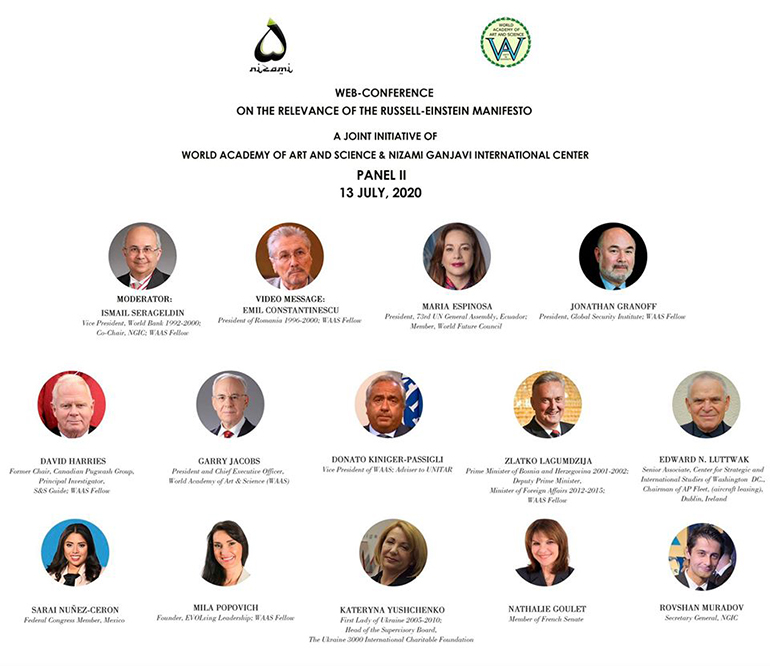July 13th 2020
65 years ago, the Russell-Einstein Manifesto argued – at the height of the Cold War – against the nuclear threat, asking us to only remember our humanity and forget the rest. At the time, ”the rest” primarily meant the clash of ideologies, the struggle between Communism and Democracy. Today, to ”remember our humanity” is to nurture a universal consensus on those moral values that protect both the individual humanity of each of us in turn, and the dignity of each community in part.
Today’s video conference aims to put into motion a multilateral collaboration between nation-states, international organizations, the academic milieu and civil society, one that might confer concrete meaning to what we all too often – and too vaguely – refer to as “global governance”. Often is the inefficiency of the United Nations, of UNESCO and of other international organizations invoked, glossing over their unequivocal merit in having preserved peace and having prevented a new – and, perhaps, final – World War. In my opinion, this impression of inefficiency stems from the fact that these organizations attempted to generate a global consensus on the concept of “the Good”, which to many would have appeared utopian and have generated warranted misgivings.
We can well surmise that each society, in turn, will have its own understanding of physical and spiritual well-being, persisting for centuries to come. To attempt to standardize these worldviews would be to advocate for the establishment of a unifying directive on thought, and would endlessly perpetuate existing and future points of tension and conflict. Political doctrines, symbolic contexts, local traditions and belief systems are irreducible, and therefore, any syncretic project capable of rending the uniqueness of these communal discourses and systems of representation as relative to one another raises an entire series of legitimate suspicions. Moreover, we cannot engage in a fruitful discussion if our interlocutor is perceptive of the threat of having his identity subsumed; and nothing can offer us the authority to ever claim the absolute superiority of our own offer in comparison to the other on the table.
On the other hand, none can today justify the pretence and conceit of reducing the vastness of mankind to the denominator of one’s own political, economic, cultural or religious beliefs. This is why I find it a reasonable way forward to attempt to identify the Evils we must together combat in from the very outset. It is in the interest of all nations to come together on the grounds of rejecting all that they deem undesirable.
I am certain that most people reject war, terrorism, torture, pollution, thought crimes, xenophobia, racism and genetic manipulation, the exploitation of minors, social exclusion, famine, and professional discrimination along lines of gender, religion or ethnic appurtenance. Together, we have a duty to identify such pathological tendencies, just as we can jointly heal the wounds they continue to cause.
In order for post-war and post-conflict conciliation to be possible, the leaders of the respective societies must be able to find a new way of approaching so-called “dead-end” situations, and are in need of new language in order to convince not just the world, but also their own citizens.
We now have the opportunity to launch a project dedicated to promoting a culture of peace that welcomes the input of scientific researchers in the arts and humanities, notable scholars, theologists, writers, artists, architects and musicians alike; a culture of peace capable of edifying a space for knowledge and understanding based on cooperation and mutual respect.
The post-modern society in the second half of the 20th century promoted equal rights and racial and ethnic freedoms, equal rights and opportunities for women, and mandated respect for those who choose to be different. This constituted significant and impressive progress, but also had the side effect of dividing society, risking its atomization. To find a timeless common goal that outlasts and surpasses conjectural solidarity in opposition will prove a difficult task. Such an ideal could well be Peace. A peace not imposed under the fearful threat of reprisal, but a common peace stemming from the joint conscience of billions of people.












